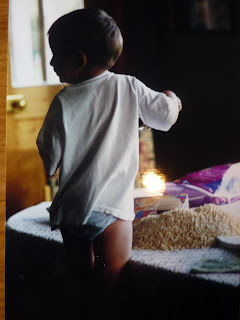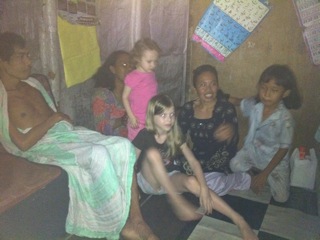Four mums describe areas of parenting that they have worked at to ensure they make the decisions and not their children. This post continues from "PARENTS PUTTING CHILDREN CENTRE-STAGE IN LIFE" WEEK 55 QUOTE 55.
1. KIDS DICTATING WHEN THEY'LL GO TO BED.
"I think one of the big areas for us has been around sleep and bedtimes. We once stayed with a close family member and I was sad to hear them asking their 4 - 5 year old, at 9pm, "don't you want to go to bed now?....no?....oh well..." We had to endure an evening with a grumpy child and a boring board game (since the adults were forced to continue to play with the child into what ought to have been adult socializing time) (Our own children had already been put to bed in the guest room)
I think our bedtimes are reasonable and age appropriate, but they have been set by us, and never dictated by the child's desires. Of course, there will always be special nights when visitors, including children, mean a special 'late night' - but only when there are visiting children involved. Then it's a special treat and a memorable and happy thing. You can see the relief on the face of visiting adults when you get to that stage in the evening where children begin to dominate, and the host parent issues a firm "bed time, darlings...", followed up with action. The ensuing peace and time to speak of important things between grown ups, in privacy, is so valuable and important to preserve." N.
Bedtime can be a daily battle for parents and an embarrassing experience if parents have no real plan to go by.
SUGGESTIONS~
* Decide what the bedtime will be. As "N" says, age appropriate times.
* State this time to your child. Some people like to give a "5 minutes to go" warning to the child, so they are ready when time is up and no discussion needed. This is especially important when you have visitors and want the child to go to bed so you and the visitors can talk.
* As "N" says, "follow up with action". Stick to the time even if you are in the middle of making coffee, a great movie, or fun time... This is the hard part for parents, but the crucial part for the child, because it's the only way they get the message that it is you who is making the decision, not them.
2. KIDS INTERRUPTING AND TALKING OVER THE TOP OF ADULTS.
"My children have always been great talkers and in their excitement to tell me things, they regularly come to me when I'm in a conversation, and just start talking! I don't like it. It throws me off the conversation and sometimes my friends giveway, so my child takes over and the conversation is steered away from my friend and on to my child.
Years ago one of our children as a littlie wouldn't sit down on the chair at the table. Instead they would stand on the chair. No amount of talking about sitting down on the chair brought any change. So my husband and I resorted to standing on our chairs when we came to eat meals. (I must admit we really had to hold ourselves back from laughing - it WAS fun to do it). We stood and ate. To our amazement our child got the picture and nothing more had to be said. From then on they sat on the chair at the table.
So with this success in mind we I tried the same technique. When they were in a conversation between themselves, I would just move in and start to talk to them about what time I wanted them to take their shower, or remind them that they were on wiping up after dinner tonight, or tell them that I was going to phone Grandma now.... It really didn't matter what I said, I just interrupted them, took over the conversation enough to throw them off theirs.
After a few of these episodes they started to ask me what I was doing, so I explained. There was the signs of understanding across their faces.
They still interrupt at times, but far less often and I handle it by interrupting them as they talk to me, they remember and leave me to my conversation." K.
This habit is so common! Little children particularly find it hard to understand mum is not available at any time, for them. But even preschoolers can learn to wait and be patient until mum can help them.
It is true that some children only learn things by 'feeling' the consequences. They know the heater is hot, because they momentarily felt it and it hurt. The methods described by "K" may not be you, but I think the success came because the mum had a plan, and consistently followed it.
ALTERNATE SUGGESTIONS~
* Parents need to decide on a plan of action and explain it to the child.
* Choose a plan you feel comfortable with.
* Practice it at home first otherwise it will not work in public.
* It is very important to keep to the plan every time and not accept the old pattern.
3. KIDS NOT THE FOCUS OF FAMILY LIFE, RATHER KIDS FITTING INTO FAMILY LIFE.
"We've decided to do things that we feel called to, DESPITE our children (like the decision to come here to Mexico). Instead of waiting for a good time when the children were older, or more independent, we decided to do what we felt challenged to do and not let our stage of parenthood call the shots. Of course this means we take our children's needs into account and recognize the limitations that exist with a young family, but not to the point where we decide to choose the easy option over the one we feel we really should take." Pi
"In thinking about this issue of 'kids taking centre stage', my mind goes immediately to our experiences as a family last week. It's been the end of the fasting month, and here in our part of the world everything shuts down as people celebrate and visit each other in their homes. We spent many days visiting friends and neighbours from a variety of levels in society. This always requires certain things of our children who are - 8 years, 6 years and 11 months. It's not a 'fun', kid focussed activity. They must shake hands with everyone as we enter the house, often sit on the floor as there is no furniture, quietly sit while the adults chat, eat sweet biscuits (which is not a challenge!), answer a few questions directed at them in the local language and then shake hands with everyone as we leave. Just to put this in perspective - my children are far from quiet, restrained kids. They yell and fight and climb on everything they possibly can, ride their bikes fast and hard with the best of them. But they have learnt over the years of doing this that there are contexts where different behaviours are appropriate, and that their immediate desires of the moment sometimes have to be put on hold. I don't know what goes on inside their heads, but while they often show initial disinterest or even begin making a fuss about it being boring and not wanting to visit yet another house ..... usually once we are on our way or have arrived they find something that they were not expecting and the experience begins to become interesting. A goat to pat, a tree to climb, a new type of biscuit to try. On one of our last days of visiting they were feeling tired and didn't know the people we were visiting. Needless to say, the conversation in the car on our way there was not positive! While at points we do decide that it's too much for them, or they are genuinely tired, sometimes it's right to push through as parents. On arrival they saw a beautiful, big fish tank full of interesting fish. They admired them and thoroughly enjoyed the visit. On the way home they eahc were smiling and holding a small jar with their own colourful fish.
The key issue for me, is that kids are part of a family to be caught up into something that is beyond just them. Isn't this what we all long for to some extent? We sometimes don't know what is best for us, or even what we actually want deep down - and children definitely don't always know what is best for them. To be part of a mini community of a family, and then a broader community means we are one among many players. This is good for our egos and also far more encouraging and exciting! To be 'centre stage' and 'directing the proceedings' is not only unhealthy and destructive for children - it is actually also a heavy burden to carry. Too much is hanging on his or her feelings of the moment.
Participating in activities that they might not choose to join is good for many reasons. Few people - adults included - would choose to do chores if we didn't have to. But I have noticed that pushing beyond their initial resistance to wash and dry up for example, can result in two happy girls getting a job done together and chatting away." Po
Once again in these two families, parents made decisions then acted on their decisions regardless of difficulties and inconveniences. The children followed the lead of the parents.
Knowing all four of these families well, I am eager to see what comes of each of these children who are all well adjusted, content and definitely not centre-staged children.
THISWEEKWITHTHEKIDS ~ do you need to make some decisions in particular areas of your life where your children are calling the shots? I hope the above comments are of some help and inspiration for you.
Cathy





No comments:
Post a Comment